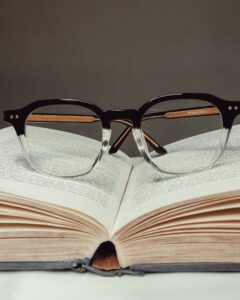
Photo credit: emmanuel ikwuegbu – unsplash.com
By Debbie Burke
In the US, 130 million adults read below sixth grade level.
Shocked?
Me, too.
But, according to the US Department of Education, 54% of people ages 16-74 fall into that category.
Most writers take reading for granted, as automatic and effortless as breathing.
I certainly did…until I couldn’t.
Recently I had cataract surgeries in both eyes, three weeks apart. Those three weeks of limbo slapped me in the face with the realization how much I depended on reading just to get through the day.
Because of myopia, I’ve worn glasses since sixth grade. Over time, my nearsightedness worsened to the point where I couldn’t even see the big E on the eye chart.
True story: without glasses, I once mistook a dark brown house for a UPS truck.
For the past couple of years, increasingly strong prescriptions could no longer fix the problem. Near or far, my world was blurry.
Hence, cataract surgery was the only option.
Ten minutes under the scalpel implanted a new lens that almost instantly corrected vision in the left eye to 20-20.
An absolute miracle!
But my right eye was still 20-800. Objects were clear up to about four inches away, then faded in fog.
My wonderful 20-20 left eye could see hundreds of feet away but not up close.
I was cockeyed. (Some people say that’s nothing new!)
The optician tried popping out the left lens in my glasses but that turned out to be as disorienting as five shots of tequila.
For computer work and reading, I was non-operational.
After surgery, physical restrictions included no bending over, lifting, or strenuous activity.
No vacuuming? No problem!
But that also halted my regular exercises like gardening, Zumba, and air boxing. Thankfully, walking was okay.
That made me realize reading and/or writing normally occupied 12-14 hours of each day. How could I get any work done?
There are free-standing magnifiers for computer screens but $100+ was too much of an investment for three weeks’ of use. Dollar Store readers helped a bit but soon caused eyestrain.
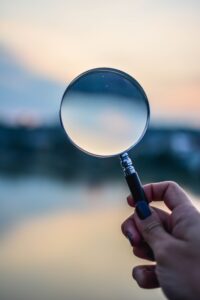
Photo credit: lilartsy – pexels
A pirate patch and magnifying glass worked marginally but awkwardly.
This would have been the perfect opportunity to try audiobooks…except I couldn’t read how to download them.
From across the room, I could clearly see the spines of books on my TBR pile but I couldn’t read the insides.
Driving was allowed but, when I took the car for service, I couldn’t read the repair list and invoice. The bank’s ATM screen was a blur. So were price stickers on supermarket shelves—probably just as well not to see how much they’d gone up since the week before!
The list goes on and on: product labels, instructions, on/off switches for appliances, texts on the phone, cable connections like audio, video, auxiliary.
I couldn’t even read the directions on the various bottles of eyedrops I had to use multiple times each day.
Most every task in life required reading.
How does someone who can’t read or reads at a low level navigate through today’s world?
According to the Barbara Bush Foundation for Family Literacy:
To read a driver’s license manual, you need to have a sixth-grade reading level. To hold a job as a cook: seventh-grade level. Directions on an aspirin bottle: eighth-grade level. Understanding frozen TV dinner instructions or to get a job as a mechanic or supply clerk: ninth-grade level. Newspapers: high school level. Apartment lease: college.
Let’s not even talk about filling out a tax return.
The Foundation’s 2021 report reveals staggering statistics that cause economic, social, and health deficits.
The U.S. could be losing up to $2.2 trillion—or 10% of GDP—in economic growth due to low adult literacy rates.
- The existing gap in digital literacy skills could cause 76% of Black individuals and 62% of Hispanic individuals to be shut out or under-prepared for 86% of jobs in the U.S. by 2045.
- Low-literate adults are four times more likely than others to report low levels of health, requiring hospitalization and using emergency services at significantly higher rates.
Per the Governors’ Early Literacy Foundation:
Illiteracy and crime are connected. The Department of Justice states, “The link between academic failure and delinquency, violence, and crime is welded to reading failure. Over 70% of inmates in America’s prisons cannot read above a fourth grade level.”
This recent experience made me appreciate that reading is a luxury not everyone has access to. People who can’t read are doomed to a life of struggle and frustration.
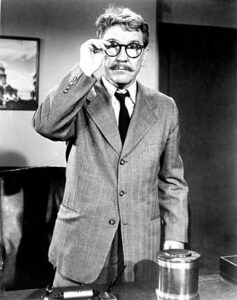
Processed By ImageMagick,
Remember Henry Bemis from The Twilight Zone? He found himself in a post-apocalyptic world where he rejoiced in the newfound luxury of unlimited reading…until his glasses broke.
Unlike poor Henry, my inability to read only lasted three weeks and ended with a miracle of new vision.
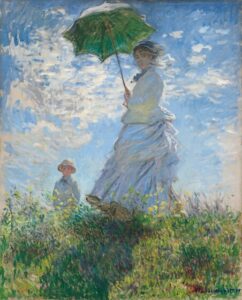 My world no longer looks like an Impressionist painting. I can see individual leaves on trees, blades of grass, street signs (oh, that’s where I was supposed to turn).
My world no longer looks like an Impressionist painting. I can see individual leaves on trees, blades of grass, street signs (oh, that’s where I was supposed to turn).
The gift of improved sight is incredible.
But the gift of being able to read again runs a close second.
~~~
Thanks to Kay DiBianca who introduced me to the worthy nonprofit Barbara Bush Foundation for Family Literacy.
~~~
TKZers: How would your life change if you couldn’t read? What is your most important reason for reading?
~~~
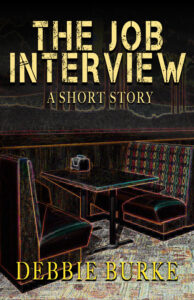
Cover image by Brian Hoffman
Receive a FREE short story, The Job Interview, when you join my reader’s group at debbieburkewriter.com

Hear, hear, Debbie. I’m starting my nephews early in this journey that I myself have been on since I learnt to recite my ABCs. Every time they stay over I make sure i have something for them to read instead of playing video games all the time. I’ve always loved reading and that has fashioned my career as a writer. It breaks my heart that so many of young people today can spend ours scrolling through 30 second videos and find satisfaction. I suppose it’s the world we’re living in now, but it saddens me all the same.
Nana, kudos to you for encouraging your nephews. Love of reading is a legacy you’re giving them that lasts their whole lives and will make their lives richer and more successful.
Took me a minute for the reading bug’s bite to take, but since then… usually anything I can get my eyes on… even cereal boxes at breakfast… and being raised as an airline brat, riding standby and standing-by through numerous “bumps” and shuffles to the NEXT (potential), flight taught me to have something both engaging and portable…
To your points about the struggles of low or no reading skills, don’t forget to add the civic responsibility of voting… and not just for candidates, but amendments and propositions – which are often written in obfuscational and seemingly contradictory ways that challenge me to recall diagramming sentences in high school… and sometimes seem to mean voting “yes” can result in a “no” vote…
In any event, here’s a speedy recovery and joyful views…
George, great point about civic responsibility.
There used to be laws making it illegal for slaves to learn to read and write. People who passed those laws realized education would destroy their immoral control over others. They were right. Literacy means emancipation.
Debbie, I’m so glad you were able to have surgery to correct your vision, and that it was successful. After my mother-in-law had cataract surgery and we went to visit her, she started sobbing. She said she had never seen the faces of her grandchildren clearly and they were three and eight. Modern medicine is truly a wonderful thing.
My husband complains about needing reading glasses, but I’m thankful for mine because I wouldn’t be able to read without them. I think I’d go into a deep depression if I couldn’t continue to read novels, research, interesting articles, everything. I’m going to double my efforts to make sure my grandchildren are strong readers. Maybe I should find a literacy program and volunteer to help others learn to read fluently.
Thank you, Becky. What a wonderful story about your MIL.
Thanks also for mentioning literacy programs. A friend used to tutor prisoners in the county jail. I was involved with a school program to improve student reading and writing. Unfortunately the pandemic shut down many of those options. Hope they start up again b/c they’re desperately needed.
Illiteracy and crime are connected. The Department of Justice states, “The link between academic failure and delinquency, violence, and crime is welded to reading failure. Over 70% of inmates in America’s prisons cannot read above a fourth grade level.”
Welded? An unusual choice of words. Correlation at any percentage does not prove causation. An excellent book that covers this and a lot more is Robert Plomin’s “Blueprint: How DNA makes us who we are.”
J, thanks for mentioning Plomin’s book. I scanned the sample and found it interesting, particularly his studies of twins and adoptees. But I don’t entirely agree with his premise that DNA (nature) overpowers environmental influences (nurture). That leads to a belief in predestination, meaning we can’t change ourselves or our fate.
While I lack Plomin’s scientific evidence, long life experience makes me believe BOTH nature and nurture influence us.
That is true, we’re a product of both our genes and our experience. And no correlation is 100%; even a correlation of 70% leaves 30% unexplained. Remember, too, that correlations are based on a large population. Individuals can vary considerably. Anyone with a TBI can certify that experience can be the major determiner of their personal outcome.
Still, on average, as Plomin’s studies have established, our genetic inheritance is usually the major factor. “There’s a divinity that shapes our ends, rough-hew them how we will.” –W. Shakespeare
I sensed something was wrong with you, Debbie, but didn’t want to pry. So glad you’re better!
Quick story: A few years ago, my neighbor helped a friend by allowing him to spend the summer in her camper while he waited for renovations to be completed in his house. The camper stayed parked in my neighbor’s yard. One day, my neighbor misplaced her glasses. She’s out in the yard and sees the friend’s indoor cat.
“How did you get out, Muffin?”
She bundles the cat in her arms and puts him in the camper. When the guy gets home from work, he heads into the camper to freshen up — and is viciously attacked by a feral cat!
Thanks for your concern, Sue, but you’re always welcome to pry–that’s what we writers do!
Great story about the cat. With my bad eyesight, I might have picked up a skunk by mistake.
I spent many years as a volunteer for the Adult Literacy League in Orlando, first as a tutor and then as a trainer. As someone who was reading without any recollection of having to “learn” how to do it, not being able to read in incomprehensible. I was the Gram who gave books, not toys, to the grandson. He’s an avid reader now. My mom suffers from macular degeneration, and due to the pandemic, had to postpone treatments. Her doctor said that she’ll never get to where she was, but hopes he can halt things where they are (which entails injections into the eyeball–eek!). She can barely manage newspaper headlines with a magnifying glass. I send her copies of my books because she likes seeing my name on the cover, but she can’t read them. Trying to talk her into audiobooks, but she’s not interested.
Terry, how wonderful that you touched many lives in a lasting way with your volunteer work. Extra credit for being a thoughtful Gram!
Macular is a horrible disease. Sorry about your mom. She can’t read your books but she must be proud of her accomplished daughter.
I’m going to interpret her “I can’t believe you wrote this” (back when she could still read) as pride and praise. 🙂
Definitely, Terry!
Great post, Debbie. I felt like you wrote this post for me. I had cataract surgery on my left eye yesterday, and my right eye will be in two weeks. Your reporting of your experience with the surgery helped me know what to expect.
In the area of reading levels and the effects on those who can’t read fluently, we have a new generation who are way behind on multiple skills – including reading – because of school shutdowns during Covid.
I love that you called instilling a love of reading in our children, grandchildren, nieces and nephews, a legacy that will last a lifetime. It’s one of the most valuable legacies we can bestow.
Thanks for an eye-opening post.
I can see clearly now the rain is gone
I can see all obstacles in my way
Gone are the dark clouds that had me blind
It’s gonna be a bright (bright)…
-original lyrics by Jimmy Cliff
Steve, our discussions about cataract surgery inspired this post. Wishing you fast healing and great success with yours.
I too am concerned by the pandemic’s interruption of learning for kids at a critical time in their young lives. Those effects will be long-lasting.
Such a fitting lyric to share. Thinking of you, Steve. Here’s to seeing things clearly and bright from now on 🙂
Glad your cataract surgery went well, Steve. Heal quickly. And don’t forget to follow the doctor’s orders. 🙂
Great post and great reminder. While my reading of books has unfortunately dropped some due to time constraints, I still am reading most waking hours of the day between work and trying to be a responsible citizen. And I can’t imagine what it was like back in times past when not everyone had their own Bible and had to wait to go hear it read to them by someone.
I’m very thankful for the advent of e-readers to help when you need larger print. I just have never been able to warm up to ‘listening’ to books, so I’d much rather read them myself.
A reason to give thanks for the precious gift of reading.
BK, the ability to enlarge the font on my Kindle is what totally won me over to ebooks.
We take reading for granted…until we’re deprived of it. I’m definitely giving thanks.
Good morning, Debbie. I’m so glad to learn that your cataract surgeries went well! I’ve known many people who have benefited from them, and said how incredible it is to see the world in bright, vivid color again. I have cataracts, at too minor a level to warrant surgery at the moment, but at some point down the road, I’ll be able to have the surgery. I’m told that it can help correct astigmatism in the process, so I’ll be able to see the brightest stars without spiky tails.
My life would be utterly transformed if I could not read. Writing is reading after all, just reading in reverse as you create a narrative. In my case, there’s lots of reading during the actual writing.
Then there’s reading for pleasure, and the most important reason, to be informed. I’d listen to more podcasts and audio books if I couldn’t read. A lot more. I need to read like I need to breath.
Oh, and I’m with you on long-standing myopia–I received my first pair of glasses in the fifth grade. My math teacher noticed I seemed to have trouble following the action on the black board. My parents had my eyes tested and learned I was near-sighted.
Enjoy the beauty you can see clearly now, and enjoy the words you can read. So happy for you!
Thanks so much, Dale! I listened to a number of podcasts to fill time.
With your interest in astronomy, yes, seeing stars as pinpoints rather than bright blurs is a new experience. I often wonder if Van Gogh was nearsighted when he painted Starry Starry Night.
Hope your eventual surgery is as successful as mine!
I can’t imagine not being able to read.
My folks were very literate and we did not have television in the home, as they thought it was idle. So we had magazines-Life, Collier’s, Saturday Evening Post (my mother’s favorite), Scientific American, Ellery Queen’s and F&SF, two daily newspapers and the New York Times on Sunday.
And books.
Both myself and my sisters learned to read early-all at age three or so- but I really took to it. It was my window to the world and my ticket to the world of ideas-still is, to this day.
It’s like breathing or eating to me.
I have met people in my careers who would say things like “Oh, I don’t read, only stuff for work when I have to.” I always wondered why people were so averse to ideas, and then I realized that in many cases it is the value that was placed on reading when they were children, mostly by their families.
It seems an integralpart of being an informed citizen.
I don’t understand it one bit.
Congratulations on a good outcome Debbie, and best wishes for your upcoming, Steve.
“My window to the world and my ticket to the world of ideas.” What an excellent description of reading, Robert.
Recently a man said to me, “I’ve never read a book in my life,” as if it were a source of pride. I felt really sorry for him.
A good reminder that we take so many things for granted — until they’re gone.
Mike, the Joni Mitchell song has run through my head a lot lately: “Don’t it always seem to go that you don’t know what you’ve got ’til it’s gone.”
This topic hits a nerve for me. If no one here knows, I am completely blind and so can’t read a lot of things. There were points in my life where I considered myself illiterate, because everything useful to read is out of reach. In university, I had so many fellow students make snide comments about how e-readers are destroying reading, and to my face to boot.
Yes, covid halted the teaching of reading in schools. But, the truth is, school no longer explicitly teaches these basic skills. The emphasis on not-lecturing-based learning has given teachers the you-don’t-really-need-to-teach anymore ticket to freedom. I did student teaching this spring, and there were numerous meetings where teachers complained about students being years behind, and the special ed teachers saying they couldn’t take on the entire student body for extra intervension. Nowhere did a teacher offer to teach more in-depth reading in their classes. So for my last lesson, I showed the students how to break down long sentences… and guess what! Each student did the assignment perfectly.
AZAli, I thought of you during my recent experience. Your ability to adapt and reach your high level of education is inspiring.
Bet you’re the best and most memorable student teacher those lucky kids have. You’re giving them a lasting gift.
Great post, Debbie, about my fave subject . . . reading.
I received my first pair of glasses at age 15. I’d been having trouble seeing the board in school, so Mom and Dad finally scraped together the money.
They had thick lenses surrounded by heavy, black frames. Walking home from the optometrist’s office, I was astounded to see the individual leaves on the trees. Also at how close to the ground my head was. 5’2″ was a lot shorter than I’d previously thought.
When I arrived home, though, and looked into the mirror (was afraid to at the doctor’s office) and saw them perched on my nose, my 15-year-old brain thought my life was over. Think military frames from yesteryear.
Fast forward about five decades. I, too, had bilateral cataract surgery. Wash, rinse, repeat, but without the 15-year-old angst over the affair. I’m constantly grateful for medical science today.
Reading was THE most important activity in my life from first grade on. I’m always amazed and perplexed when I hear someone say, “I don’t read”. My neighbor lady told me that once. It was like she’d said she just arrived from Mars or something. 🙂
On the other hand, most of my grandchildren are readers, and it just tickles me pink when I hear that the parents took them to the bookstore or the library. Two thumbs up, kiddos!
From one former wearer of coke-bottle lenses to another, good health and sight to you, Deb! And two more thumbs up to your literate grandchildren!
I had cataract surgery in April. The first thing I discovered is how little I was seeing driving at night. I am a food delivery driver. I drive 100 miles a night sometimes. I was seeing less than 60% of what I should and mostly driving on memory.
Between the computer and my phone I have my reading glasses on all the time. I do have a cool granny chain though. The next obstacle, AppleWatch. Very handy, would be even more handy if I could read it without the cheaters.
Alan, I remember you talking before about the shock/revelation of driving at night. Haven’t yet taken my first foray out in the dark but I will be mindful of what you said.
Coulda had bifocal lens implants instead of simple distance–for only $4000 more, not covered by Medicare. Choke! I’m good with cheaters.
My daughter’s love of reading was destroyed by the AP Lit reading list. Newer than Melville but not any better and hundreds of words a night required. 700 page college text books and online reading aren’t helping her.
We need to replace Gatsby with The Maltese Falcon on those reading lists.
https://www.yumpu.com/en/document/view/35345360/uchs-summer-reading-assignment-university-city-schools
Amen!
Aw, what a shame for her. After being a lit major in college and reading thousands of pages of Russian novels, I had to take a several-year-long break from reading. John D. McDonald got me back into it. Hope her love of reading can be revived later.
Morning, Debbie. Thanks for this important post on the topic of illiteracy.
But first, congratulations on your recovery. I’m so happy to hear your surgeries went well and everything has come into focus now!
As you pointed out, the ability to read is fundamental. And yet many of our public school systems have developed agendas that don’t include the basic skills. (This falls in the category of “Don’t get me started.”)
There are many worthy literacy organizations. We found the Barbara Bush Foundation for Family Literacy a few years ago (thanks for the shoutout). I know Dolly Parton also has a literacy program that gives free books to small children as a means to plant the seeds of the love of reading. These organizations, and many others like them, provide people with a true gift: skills that will enrich their lives and last a lifetime.
Have a great week, my friend.
Thanks for your kind wishes, Kay.
We share the same concern about today’s education.
The Barbara Bush Foundation has a special place in my heart b/c of good friend!
Gool looking job on this post, Debbie 🙂 I couldn’t imagine losing my eyesight and not being able to read any longer. It’s my life. But, I was headed down the blurry line until I had cataract surgery in January 2021. Completely painless and brought my right eye to 20/14. The left is just beginning to go so I should get myself on the waiting list.
Hope your second surgery goes as well, Garry.
So glad to hear everything went well, Debbie.
Thanks, Rose!